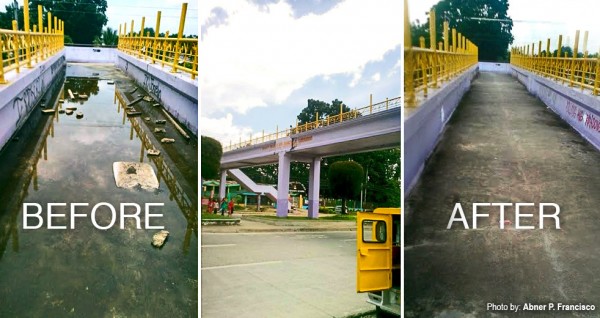If you thought that your daily commute to work was difficult – getting the buses in London or riding the (usually late) trains in Amsterdam - and if you think your government should improve public transport, spare a thought for the people in North Kotabato, a village in the south of the Philippines…
One bridge that gets you to work.
Half a metre of stagnant flood water to wade through every day.
A group of teachers, priests, architects, dentists and social workers committed to making a change, and making government more accountable for public services.
Every day in the town of North Kotabato, people would cross a footbridge to get their children to school or get to work. But during the rainy season, the footbridge would flood, and everyone crossing would have to wade through a long, knee-deep pool, removing their shoes so they wouldn’t be drenched with dirty and smelly stagnant water.
To make use of the bridge during the rainy season, some parents put some stones, sand bags, and pieces of bamboo and lumber for their children and other passersby to step on and not get soaked. - local teacher, North Kotabato, Mindanao province
As of this year, the footbridge has been re-engineered. There are new drainage holes, and the pathway is clear in both dry and rainy seasons: a simple amendment, done by the local government, but only possible after ordinary people campaigned successfully for change.
So why did this campaign – unlike so many others – actually work?

Before and after photos of the bridge in North Kotabato. Copyright: Citizen Action Network for Accountability
The Institute for War and Peace Reporting (IWPR) has been training and mentoring citizens in 28 areas across the Philippines to better understand, highlight and engage with their local governments on key public finance issues.
The bridge in North Kotabato is just one example of how this public pressure has created change, and there are lessons here about how to support community groups to create public pressure and bring about the changes they want to see in their communities.
Building an engaged network of citizen journalists
IWPR doesn’t just help community members understand complicated issues like audits, public budgets and anti-corruption laws: it also equips them with journalistic and investigative skills. Through the project’s training sessions, they learn how to follow a paper trail, use social media, conduct interviews and participate in press conferences so their stories are taken up by the media.
These are concerned citizens who group together - they don’t know yet the sophistication of using the media. – Rorie Fajardo, IWPR
The community groups are contributing stories to the Citizen Action Network for Accountability (CANA) website, sharing photos and videos taken with their cell phones, bringing to light important issues for their community.
By communicating the mis-spending (or mis-allocation) of community money through articles that are often picked up by the Filipino media, ordinary people are creating public pressure to campaign for change.
In some provinces, groups use the radio to invite local government officials in an open discussion and post news and updates on Facebook, inviting people to share their comments. - Rorie Fajardo, IWPR
Finding space for a “friendly neighbourhood watchdog”
As you would expect, initiatives that scrutinise local government groups are not always welcome. In some areas, local authorities respond by intimidating and threatening citizen journalists who are critical of their performance. Staying objective and professional is a serious challenge, especially in small communities where the person you are criticising may also be your neighbour.
However, while in some provinces community groups are seen as causing chaos, in other areas groups see the government as their ally, not an adversary, bringing local government on board with the idea that community groups are a “friendly neighbourhood watchdog”.
Public ’voice’ and public accountability
The team know that just raising the profile of an issue is not enough. CANA was formed because local communities were raising their voice to demand more responsive governance, but their action is based on collaboration with local government. They aim to help both the government and the communities they serve see a full picture of what is happening on the ground – whether it’s a flooded bridge or cases of corruption.
It’s not easy. Government and citizens have an uncertain relationship when talking about failures in services, or mis-spending of money.
When I talked with local action groups, I could see the concern on people’s faces when describing their work. But one thing was really clear: despite all the challenges, they are more engaged than ever, and more convinced the public pressure is a key driver of public accountability.